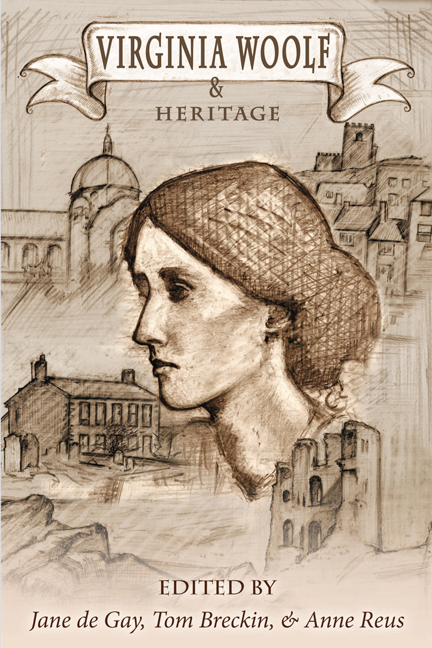Book contents
- Frontmatter
- Contents
- Introduction
- List of Abbreviations
- HERITAGE: A DEBATE
- HERITAGE, EDUCATION, AND MENTORING
- HERITAGE SPACES
- LITERARY AND CULTURAL HERITAGES
- QUEER PASTS
- MODERNISM AND HERITAGE
- WRITING LIVES AND HISTORIES
- WOOLF'S LEGACIES
- “A shadow crossed the tail of his eye”: The Reception of Virginia Woolf in Romania: Heritage Transformed
- Woolf 's Imaginarium: Exploring Virginia Woolf 's Legacy to Contemporary Polish Culture
- An Office of Her Own? Alice Munro and the Legacy of Writing with In-Authority
- Thinking Back through Virginia Woolf: Woolf as Portal in Lidia Yuknavitch's The Small Backs of Children
- The Malicious Gene: An Evolutionary Games Strategy? Woolf 's Hawkish Inheritance
- FINALE
- Notes on Contributors
The Malicious Gene: An Evolutionary Games Strategy? Woolf 's Hawkish Inheritance
from WOOLF'S LEGACIES
- Frontmatter
- Contents
- Introduction
- List of Abbreviations
- HERITAGE: A DEBATE
- HERITAGE, EDUCATION, AND MENTORING
- HERITAGE SPACES
- LITERARY AND CULTURAL HERITAGES
- QUEER PASTS
- MODERNISM AND HERITAGE
- WRITING LIVES AND HISTORIES
- WOOLF'S LEGACIES
- “A shadow crossed the tail of his eye”: The Reception of Virginia Woolf in Romania: Heritage Transformed
- Woolf 's Imaginarium: Exploring Virginia Woolf 's Legacy to Contemporary Polish Culture
- An Office of Her Own? Alice Munro and the Legacy of Writing with In-Authority
- Thinking Back through Virginia Woolf: Woolf as Portal in Lidia Yuknavitch's The Small Backs of Children
- The Malicious Gene: An Evolutionary Games Strategy? Woolf 's Hawkish Inheritance
- FINALE
- Notes on Contributors
Summary
It was a scene in William Boyd's novel Any Human Heart that provided the donnée for this paper. Through the invented diary entry of his protagonist Logan Mountstuart, Boyd narrates a social event for Tuesday 4th March 1935 (171). Some details in this fiction derive from Virginia Woolf 's diary of Wednesday 6th March 1935, “And then with the surly unhappy opinionative Adrian Daintrey in full evening dress to the Café Royal, which lacks the old romance; but I was glad to snatch a sight of it, & to wonder about life there, for a second” (D4 286). Boyd takes the biofiction writer's liberty of creating a meeting between his own characters and historical ones. He appropriates and conflates material from Woolf 's letters (L5 299–300) and diaries (D4 210–211 and 285–287; D5 188). In the novel Daintrey, a painter friend of Duncan Grant, arrives with a party which includes Virginia Woolf. She smokes a cigar and opines that the crowd is “ghastly” (Boyd 171). Freya, Mountstuart's lover, mentions that Cyril Connolly was there a moment ago with his entourage. Boyd has his “VW” ask “Was his black baboon with him?” qualifying this with “His little gollywog wife” (171).
These deeply shocking words are adapted from Woolf 's diary and letters from March and April 1934. Mountstuart is sarcastic about Woolf 's “reputation for charm” and reproves her with “You should be ashamed of yourself “ (Boyd 171). Freya is affronted by what she calls Woolf 's “spite” and Mountstuart replies, “you would never imagine the person who wrote all that lyrical breathy prose was steeped in such venom” (171). This paper will consider Woolf 's venomous propensity, applying the model from games theory of “hawk” and “dove.” In The Selfish Gene Richard Dawkins shows how units of heredity, may be seen to affect the social conduct of their bearers. This paper adapts the trope of “the selfish gene” to consider what I have termed “the malicious gene.”
In her diary for April 30th 1934 Woolf records staying in Ireland at the home of Elizabeth Bowen and her husband Alan Cameron.
Woolf likes Alan, summing him up as a “good humoured bolt eyed fat hospitable man” (D4 210–211). Irish life is described as “ramshackle & half-squalid…empty & poverty stricken” (210).
- Type
- Chapter
- Information
- Virginia Woolf and Heritage , pp. 257 - 262Publisher: Liverpool University PressPrint publication year: 2017



